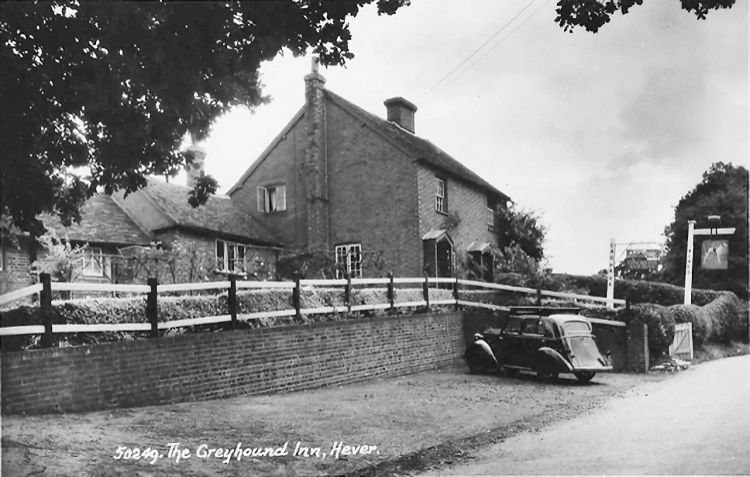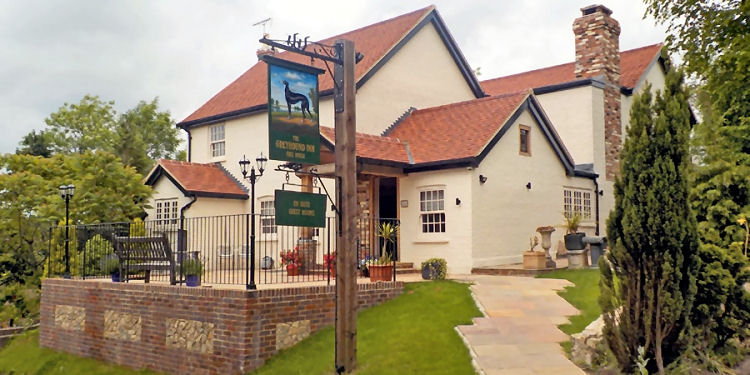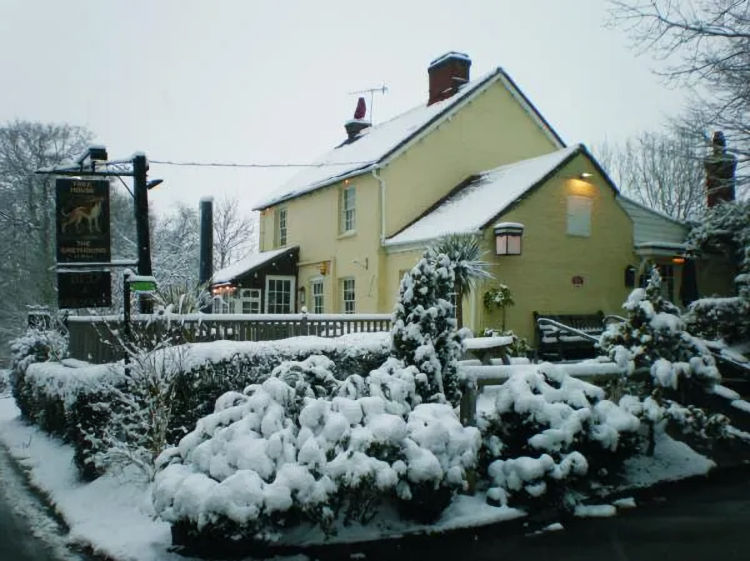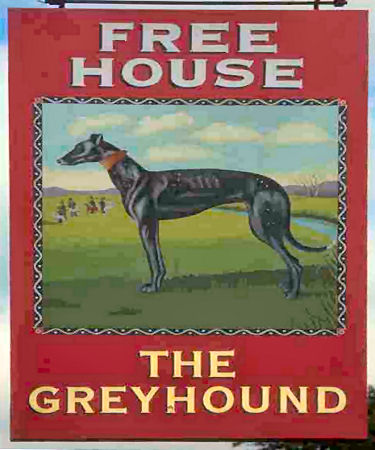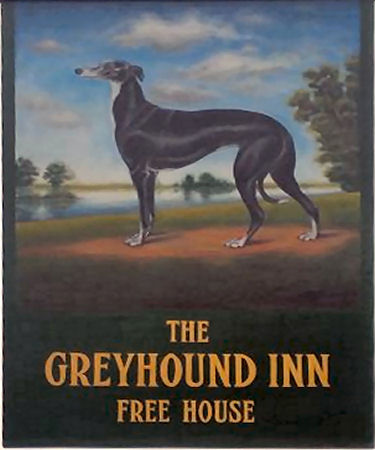|
Sevenoaks Chronicle and Kentish Advertiser, Friday 19 August 1949.
Former hotelkeeper sent to prison.
Series of charges against an ex army officer.
The story of an ex-8th Army captain's incursion into the licensing trade
was heard at Sevenoaks Court on Thursday when Gerald Thomas Uwins,
formerly of the "Greyhound Inn," Hever, was sentenced to a total of 12
months imprisonment on seven charges, 21 other cases being taken into
consideration.
Mention was made of a sum of £500 being advanced to accused (in
connection with which there was no charge) to finance him on taking over
the "Greyhound" by the man who was best man at his wedding and who had a
receiving order made against him on his failure to repay the money,
which he had borrowed.
It was stated that the accused's first wife had divorced him and that he
had since married a girl of 21, telling her his age was 37 and that he
had been to Oxford. According to the police, Uwins is 46 years of age.
Uwins pleaded guilty to the following charges.
Stealing by a trick £250 from Harold Charles Ward.
Obtaining £100 from Alfred John Studholme by false pretences, with
intent to defraud.
Obtaining supplies from Preston Mineral Water co., to the value of £2
16s. by false pretences; obtaining supplies from the same company to the
value of £3 12s. 9d.
Obtaining supplies from Leonard Groves, "Holmesdale Tavern," Sevenoaks,
to the value of £2 12s. by false pretences; obtaining supplies from John
Edward Mannifield, "Camden Arms," Sevenoaks to the value of £16 6s.
A false entry showing £7 to have been paid to Southdown Motor Coaches.
He elected to be dealt with summarily.
For the prosecution, Mr. Tunstall and leads that while working as a
barman at the "Black Prince Hotel," Bexley, accused got to know a Mr.
Roy Bawcutt, whom he told he had the opportunity of taking a public
house and asking Bawcutt to finance him, offering to pay 50%, of the
profit monthly. Bawcutt managed to get £500 which he paid to Uwins and
was himself later sued for the money, which he had borrowed.
In November or December last, Uwins got into contract with Mr. Ward,
father-in-law of Bawcutt. He told Ward he had taken the "Greyhound" at
Hever and that Bawcutt had promised him £1,000 but had only giving him
£700, that he was in low water and had not enough to buy a crate of
brown ale. Ward let him have £250 on condition that he took out a life
policy for £1,000. The policy was taken out but allowed to lapse after
the first payment and Ward have not received anything back.
In January of this year, Uwins met Mr. Alfred John Studholme of High
Ridge Farm, Oxted and told him he wanted to work up the catering
business. He asked for and received £100, promising to repay as soon as
business improved. Apparently just before Uwins left the "Greyhound"
Studholm asked about the money and was issued he would be paid when the
business was sold. Four or five days later Uwins left the "Greyhound"
and Studholme heard no more about him or the money.
Mr. Tunstall detailed the transactions with the Presta Mineral Water
Co., and how they have finally stopped supplies on credit, and describes
how Uwins had approach Mr. Groves and Mr. Mannifield and obtained the
supplies mentioned in the charges by saying in one case that he had sold
out over Easter and then the other he had been let down by someone.
Dealing with the alleged falsification of accounts, Mr. Tunstall told
the court that the South Downs Motor Company provided transport for the
darts club connected with the "Greyhound," someone collecting the money
and handling it to accused, who paid over to the company, when the
account was produced it showed that all accounts had been paid when two
items totalling £7 and not been paid.
Asking for two witnesses to be called "for cross-examination," Mr. Lance
House said he had understood the witnesses would not be present, but
they were.
The first was Roy Bawcett who agreed that he had been very friendly with
Uwins. He agreed that Uwins might have had the impression that he would
try and find £1,000 and that the arrangement was that he should find the
money and Uwan's run the business.
He agrees that he was best man at Uwins wedding but did not know what
part of the advance was used to meet the expenses of the wedding. He had
gathered from Ewins that he had money but that it was tied up in
property. He agreed he had never trouble to find out how much had been
paid to the brewers and that he had £50 back. Following the action
against him for the money he had borrowed to give Uwins, a receiving
order had been made against witness and he had lost everything including
his home and his job. Harold Charles Ward, Crayford, told Mr. House that
when Uwins saw him he thought it was a case of distress.
Addressing the magistrates, Mr. House said the same to be some doubt
about defendants age. He thought he was 38 but he had no birth
certificate and it might be that he was older. He had no recollection of
his parents but only knew that he had been brought up by an uncle and
aunt.
He attended a grammar school and then went into various businesses
eventually carrying on his own business as an estate agent. He had been
a territorial and was called up on the outbreak of war, serving six
years with the 8th Army and reaching the rank of Captain. In the
meantime he had married, but his marriage was not happy. He separated
from his wife and after the war was divorced by her on the grounds of
desertion.
On coming out of the army he was rather at a loose end and ultimately
decided he would like to learn the hotel trade and got a job at Bexley,
where he started at the bottom.
When he took the "Greyhound" (for which he had paid £300,) he had no
capital, only the expectation of another £500 being brought in. When he
got to the "Greyhound" he found trade was poor and the catering season
nearly it's end. His anxiety to carry on somehow until the summer season
this year, when he hoped to make some money and repay the loans.
His wife had stood by him magnificently and will continue to work to
help him get straight again.
It was stated by the police that Uwins was clearly 45 and London born.
His mother was alive though it has been impossible to trace her. At the
age of 6, Uwins was adopted by and uncle by marriage and was educated at
Market Harborough Grammar School.
In 1930 he was married at Witney, and there was one child of the
marriage. Before the war he was a commercial traveller and then listed
in 1939, rising to the rank of Captain. He was demobilised in 1946 and
on his discharge, deserted his wife who obtained a divorce on the
grounds of his adultery, the decree nisi being made absolute in April,
1948.
Uwins was unemployed from the time of his demobilization until February
1948, when he obtained employment as a barman at the "Black Prince,"
being discharged in July 1948 for dishonesty.
On August 11th, 1948, he married a 21 year old girl at Dartford. He
informed her and his relations that he had been educated at St. John's
College, Oxford and that he was 37.
Worked on Farm.
Uwins became licensee of the "Greyhound Inn," Hever, in August 31st,
1948, but, alleged the police statement, owing to the manner in which he
conducted the business, the brewers informed him in April of this year
that is notice to quit would be appreciated. Uwins relinquished the
licence in May 24th, and in June obtained a position on a farm in
Hampshire.
The police also stated that accused had asked for 21 other cases to be
taken into consideration, the total amount involved in all being £1,209,
also that the majority of these were for obtaining money by false
pretences and for for stealing.
After retirement of 20 minutes the chairman of the magistrates told
Uwins he was guilty on his own confession of these seven senior charges
and had asked them to take into consideration 21 other charges. These
charges were all most serious and had extended over a considerable
period. They had been deliberate and accused must realise he had cause
distress to a great many people.
He then sentenced Uwins to six months imprisonment on each of the first
two charges, to run consecutively and one month on each of the other 5
chargers, to run concurrently with the sentences on the first two
charges.
|
